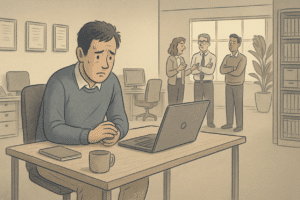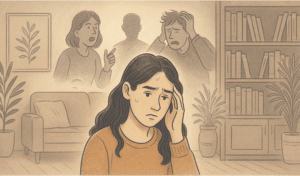Key Takeaways
- Stress is typically triggered by external factors and resolves when the stressor is removed, while anxiety often persists without a clear cause.
- Physical symptoms overlap between the two conditions, but anxiety has additional psychological symptoms like excessive worry, restlessness, and a sense of impending doom.
- Diagnostic approaches differ significantly: stress is usually self-assessed through journals or inventories, while anxiety often requires professional evaluation using standardized tools.
- Treatment for stress focuses on relaxation techniques and lifestyle changes, whereas anxiety may require additional therapeutic interventions like CBT or medication.
- A Mission For Michael (AMFM) offers well-rounded, evidence-based treatments for both stress and anxiety disorders.
Stress vs Anxiety
Stress and anxiety, although related, are distinct experiences that affect our lives in different ways.
Stress is often a reaction to a specific external situation, such as a looming deadline or a difficult conversation. It is typically short-lived and resolves once the stressor is removed.
Anxiety, on the other hand, tends to persist even in the absence of a clear trigger. It is characterized by excessive worry and fear that can disrupt daily activities.
| A Mission For Michael: Expert Mental Health Care Founded in 2010, A Mission For Michael (AMFM) offers specialized mental health care across Southern California, Washington, and Virginia. Our accredited facilities provide residential and outpatient programs, utilizing evidence-based therapies such as CBT, DBT, and EMDR. Our dedicated team of licensed professionals ensures every client receives the best care possible, supported by accreditations from The Joint Commission and the California Department of Health Care Services. We are committed to safety and personalized treatment plans. Start your recovery journey with AMFM today! |
Symptoms
Physical Signs
Physical symptoms of stress can include muscle tension, headaches, and changes in appetite. You may also notice increased heart rate and sweating—the body’s natural response to perceived threats, preparing you to take action.
Emotional Indicators
Emotionally, stress can lead to irritability, mood swings, and feelings of overwhelm. You may find yourself easily frustrated or unable to relax.
Anxiety, on the other hand, manifests as persistent worry, fear, and a sense of impending doom—which significantly impact your quality of life if not managed properly.
Common Tests for Stress
While stress is often self-diagnosed, certain tools can help you understand its impact on your life. For example, the perceived stress scale (PSS) measures your perception of stress over the past month. This simple questionnaire can provide insight into how stress affects your thoughts and feelings.
Keeping a stress diary is another way of assessing stress. By noting when and where you feel stressed, along with the intensity and duration, you can identify patterns and triggers to develop management techniques.
Anxiety Diagnosis
Mental health professionals use diagnostic criteria from the DSM-5 (Diagnostic and Statistical Manual of Mental Disorders) to identify anxiety disorders. This involves a detailed assessment of symptoms, including their frequency, duration, and impact on daily life.
Aside from this, self-report questionnaires like the Generalized Anxiety Disorder 7 (GAD-7) can be useful. GAD-7 helps gauge the severity of anxiety symptoms to provide a baseline for treatment, but a comprehensive evaluation by a professional is crucial for an accurate diagnosis.
Plus, in some cases, anxiety can be linked to medical conditions or substance use, so healthcare providers may need to conduct physical exams or laboratory tests to rule out these factors and make sure the treatment targets the root causes of anxiety.
Treatment Options
Relaxation Techniques
Practices such as deep breathing, progressive muscle relaxation, and guided imagery can help calm the mind and body. These techniques activate the parasympathetic nervous system, counteracting the stress response.
Therapeutic Approaches
Cognitive-behavioral therapy (CBT)—a widely used approach for both stress and anxiety—helps you identify and change negative thought patterns that contribute to these conditions. By challenging distorted thinking and developing healthier coping strategies, CBT can significantly reduce symptoms.
Mindfulness-based stress reduction (MBSR) is another effective therapy, which combines mindfulness meditation and yoga to increase awareness and acceptance of the present moment. MBSR can help you manage stress and anxiety by fostering a non-judgmental attitude toward your experiences.
For those with anxiety disorders, exposure therapy can also help. It’s essentially a gradual exposure to feared situations or objects to reduce anxiety over time. Under the guidance of a therapist, exposure therapy can help you build resilience and confidence in facing your fears.
Medication Considerations
Medication can be a valuable component of treatment for anxiety disorders, especially when symptoms are severe. Antidepressants, such as selective serotonin reuptake inhibitors (SSRIs), are commonly prescribed to help regulate mood and reduce anxiety.
Managing Stress and Anxiety
Daily Habits
Engaging in regular physical activity is one of the most effective ways to manage stress and anxiety because exercise releases endorphins, which improve mood and reduce stress. Aim for at least 30 minutes of moderate exercise most days of the week.
Coping Mechanisms
Developing healthy coping mechanisms is essential for managing stress and anxiety. Journaling, creative expression, and spending time in nature can help you process your experiences.
Building a strong support network of friends and family can also offer encouragement and perspective during challenging times.
AMFM: Your Partner in Managing Stress and Anxiety
At A Mission For Michael (AMFM), we’ve been helping individuals work through these complex conditions since 2010. Our accredited facilities across Southern California, Washington, and Virginia offer comprehensive programs specifically designed to address both stress-related issues and clinical anxiety disorders. We recognize that each person’s experience is unique, which is why our licensed professionals conduct thorough evaluations to determine the most effective approach for your specific situation.
Our evidence-based therapies—including CBT, DBT, and EMDR—have proven successful in helping clients develop healthy coping mechanisms and regain control over their mental health.
For those who benefit from the structure of our residential program or the flexibility of outpatient services, our team provides the support and guidance needed to manage symptoms effectively and improve your quality of life.
Frequently Asked Questions (FAQ)
How can I tell if I’m experiencing normal stress or an anxiety disorder?
If your symptoms last for weeks or months, occur without an obvious trigger, or significantly impact your quality of life, it may indicate an anxiety disorder rather than typical stress.
Can stress develop into anxiety over time?
Yes, chronic or unmanaged stress can develop into an anxiety disorder. When the body remains in a prolonged state of stress, this can alter brain chemistry and neural pathways, making a person more susceptible to anxiety disorders.
What self-help strategies work for both stress and anxiety?
Regular physical exercise, adequate sleep, mindfulness meditation, deep breathing exercises, and limiting caffeine and alcohol can help manage both stress and anxiety. Establishing healthy boundaries, practicing time management, and building a strong support network are also effective for both conditions.
Are there different types of anxiety disorders?
Yes, anxiety disorders come in several forms, including generalized anxiety disorder (persistent worry about many things), social anxiety disorder (fear of social situations), panic disorder (recurring panic attacks), specific phobias (intense fears of particular objects or situations), and others.
How does AMFM approach treatment for stress and anxiety?
At A Mission For Michael (AMFM), we provide comprehensive assessment and individualized treatment plans for both stress-related issues and anxiety disorders. We offer both residential and outpatient programs across our accredited facilities, so each client receives the appropriate level of care for their specific needs.







